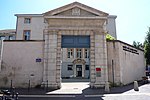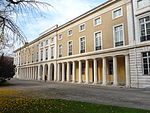Vestiges of the Gallo-Roman wall, Grenoble

The Vestiges (traces) of the Gallo-Roman wall are the remains of a fortification, constructed in Grenoble, France (formerly called Cularo) at the end of the 3rd century, under the reign of the Emperors Diocletian and Maximian. The status of Civitas marked the city of Cularo as an administrative capital of the Roman Empire. The Gallo-Roman wall was 1,150 meters in length, and had 39 semi-circular watchtowers which were 7.5 meters in diameter. It had two monumental gates decorated by inscriptions identifying the two Roman emperors. The Gallo-Roman wall played an important role in the protection of the 9-hectare urban surface of the Roman settlement. It served as a symbol of the status of Civitas. The wall was built up of small limestone blocks and was covered with plaster. Some parts of the wall were 4 meters thick and made up of limestone, pebble and tuileau rubble. These materials were held together by mortar.
Excerpt from the Wikipedia article Vestiges of the Gallo-Roman wall, Grenoble (License: CC BY-SA 3.0, Authors, Images).Vestiges of the Gallo-Roman wall, Grenoble
Place Notre-Dame, Grenoble Secteur 2
Geographical coordinates (GPS) Address Website Nearby Places Show on map
Geographical coordinates (GPS)
| Latitude | Longitude |
|---|---|
| N 45.19292 ° | E 5.73208 ° |
Address
Musée de l'Ancien Évêché
Place Notre-Dame
38000 Grenoble, Secteur 2
Auvergne-Rhône-Alpes, France
Open on Google Maps











